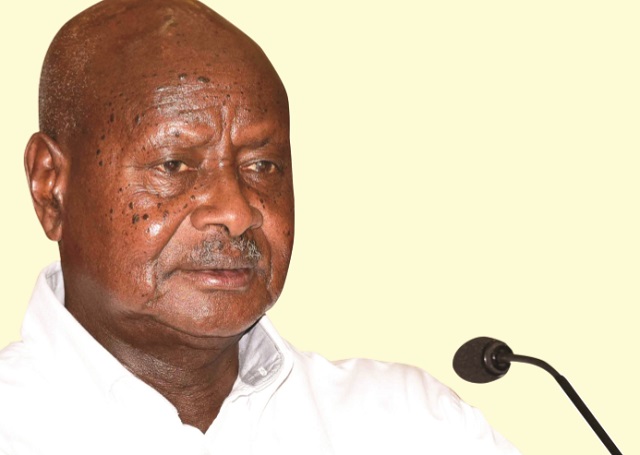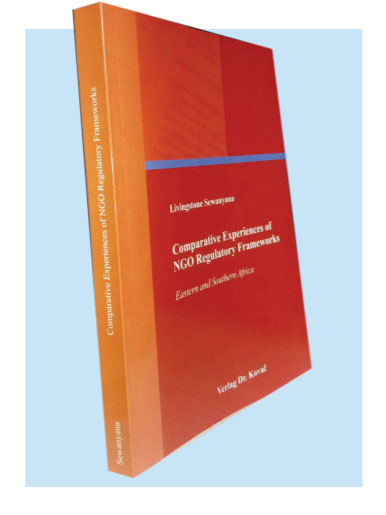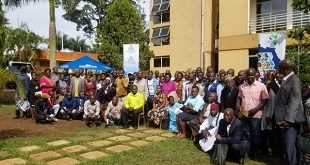
A rights activist view on the tension between the government and NGOs
Kampala, Uganda | FLAVIA NASSAKA | The government’s renewed determination to tightly monitor Non-Governmental Organisations (NGOs) in Uganda is meant to stifle other than enable civil society organisations do their work. The NGO Act passed in 2016 just before the general election is “controlling and burdensome and doesn’t create a conducive environment for inclusiveness and public participation”. Those are the views in a newly released book by Livingstone Sewanyana; the executive director of the Foundation for Human Rights Initiative.
Sewanyana says review of the NGO Act was “cosmetic”. He says archaic provisions; like Article 29 which provides for mandatory registration and Article 30, which give the NGO Bureau powers to refuse registration of an entity, should have been scrapped.
He says the most problematic article, however, is Article 44 that spells out the special obligations of NGOs, including seeking permission to operate in certain areas and not to engage in anything prejudicial to the interests of Uganda. He says these are not clear and are triggered to oppress, not to coordinate.
As a background to the present, the book titled ` Comparative Experiences of NGO Regulatory Frameworks’ notes while there was a new opening for freedom of association after the Second World War, post – independence African leaders could not let it thrive because they never understood the concept of democracy and are more interested in power.

In an interview, Sewanyana explained that research has shown him that President Yoweri Museveni, like other post independent leaders such as Kamuzu Banda of Malawi, Julius Nyerere of Tanzania and Jomo Kenyatta of Kenya, has not understood what democracy is about.
“They feared people they had worked with to achieve independence and started persecuting them leaving no room for organizing,” he says of the past leaders, “The same things are happening now; the right for citizens to express dissent has been criminalised”.
Launched on Oct.25 in Kampala, the 238 pages book, in eight Chapters explores different aspects democracy and rights. Using the history of civil movements, it analyses NGOs from as far as the colonial and immediate post-colonial era, and their legitimacy. It offers pointers about what needs to be done to enable the state and NGOs to co-exist without strife. The author uses case studies of Uganda, Ethiopia, Malawi, South Africa, Zimbabwe and Kenya to analyse how organisations in these countries are regulated and also to understand why particular countries chose particular models of regulation.
Sewanyana says he chose countries to study categorising them as progressive regimes, transition countries, or countries experiencing a backlash. Among the progressives, he lists South Africa and regimes in transition to democracy include Kenya and Malawi. Uganda, Ethiopia, and Zimbabwe are countries experiencing a democracy backlash. In these countries, Sewanyana says, any attempt at organising or dissenting is met with brutal state force which is most times supported by the law. He says this is unlike in regimes in transition democracies where while associating and organising politically might face resistance, one can easily find redress in court. In progressive regimes, he says people are allowed to organise and there is high respect for the rule of law.
Control or Coordination?
In many African countries, the book says, NGOs re-emerged because leaders could not sustain their collapsing economies and the only saviors of the situation – the World Bank and the International Monetary Fund could give them money only if they allowed people to organize politically. This argument according to sewanyana is why some people say NGOs are agents of western imperialism. And, it is at the center of why there is always tension between the state and the NGOs. There’s always a contestation over whom NGOs really represent and this power struggle becomes greater when NGOs become more relevant to the people because governments have become inept.
Sewanyana’s FHRI has recently suffered the wrath of government with threats of closure and numerous demands for documents. He says when the government realises that NGOs are becoming dominant players, in countries like Uganda the leaders adopt a state- led regulatory model to determine and control what these entities can or cannot do.
“They peddle the issue of transparency and accountability,” he says.
Sewanyana says In Kenya and Malawi, they use the hybrid model where the ideas of the NGOs and ideas of the state are represented, merged, and a joint agenda is crafted. To him the best models the self-regulatory one which is used in South Africa. Here one does not need to first register before starting an NGO. All one has to do is to notify the government to ensure that they are working within the established law. He says this model ensures freedom to organize and empowerment of people to easily deal with their own problems; be it poverty.
“People are not afraid to take the initiative,” he says.
Sewanyana who has over 15 years in the NGO world, says for transformation to occur in Uganda, the state must recognise that civil organising is critical for social, economic and political development. He recommends establishment of an independent NGO regulatory authority to take over the work of the NGO Bureau which, he says, lacks capacity to superintend over the 14,000 registered NGOs currently.
 The Independent Uganda: You get the Truth we Pay the Price
The Independent Uganda: You get the Truth we Pay the Price



